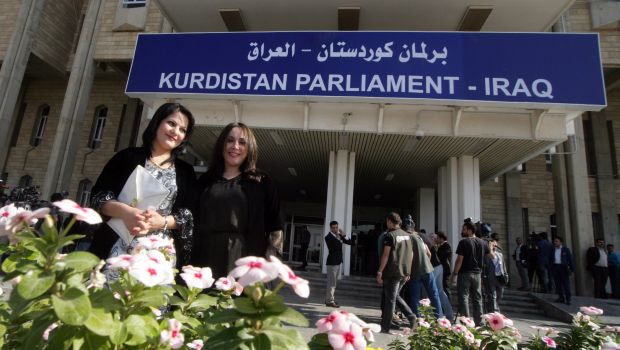
Female Kurdish deputies are pictured outside the Kurdistan parliament building in Erbil, the capital of the autonomous Kurdish region of northern Iraq on November 6, 2013. (AFP Photo/Safin Hamed)
Khusru Goran, head of the Kurdistan Democratic Party’s (KDP) parliamentary elections’ candidates and the party’s election bureau chief, told Asharq Al-Awsat that his party had wanted to field a united list of candidates as some other parties had done, but that “it was not possible.”
He said, however, that there were currently alliances between Kurdish candidates in Iraq’s Diyala, Nineveh, and Salah Al-Din provinces.
During the previous Iraqi parliamentary elections in 2010, two of the largest Kurdish parties—the KDP and the Patriotic Union of Kurdistan (PUK)—formed, along with other Kurdish parties, the Kurdish Alliance, which came fourth in those elections.
This time, Kurdish parties will be contesting 44 seats in the Iraqi parliamentary elections and 89 seats in the Kurdish provincial polls.
Goran said the KDP was prepared to run an “exceptional election campaign,” adding that it would be no less exceptional than the campaign it ran in the Kurdistan regional elections in September, when it came first, claiming almost 38 percent of the popular vote.
The spokesman for the party’s Suleimaniyah bureau, Abdelwahab Ali, told Asharq Al-Awsat that the party “had a better chance in this election campaign than in previous campaigns to win more seats in the provincial council.” However, he said he expected the KDP to come third after Gorran and the PUK—a reversal of the Kurdish parliamentary elections results in September.
Gorran and the PUK came second and third in those elections gaining 24 percent and 18 percent of the vote, respectively.
Zana Rosati, former member of the region’s parliament and head of the Kurdistan Islamic Group’s list in Erbil, told Asharq Al-Awsat that his group was working on winning two seats out of 15 in Erbil in the Iraqi parliament. He added that the group won more than 63,000 votes in Erbil during the last parliamentary elections in 2010, and that it was “working on increasing the votes to 80,000 and the number of seats to three or four.”
Salah Mezen, a leading figure in Erbil for Gorran, which is led by Nawshirwan Mustafa, said the movement would “achieve great success in the election . . . in Erbil province, where it selected for its list a number of candidates who are capable of improving services in the city.”
Back in 2010, Gorran did not join the Kurdistan Alliance, fielding instead an independent list, and came only one place below the Alliance in fifth place, though with significantly fewer votes.
Mezen added that the region’s parliamentary elections “involved many problems, most important of which was the absence of transparency at the Higher Independent Elections Commission in addition to fraud in vote-counting.”
He said: “The circumstances now are different to those during the region’s parliamentary elections, when new parties appeared to compete for provincial council seats in the city.” He added that the main competition would be between Gorran, the PUK and the KDP.
Mezen called for the process to be managed with “transparency and in accordance with international standards, and to avoid fraud and individual actions by the staff of the elections council.”
He said “the political program of the lists will decide who wins,” and said his list was competing for first place on the provincial council because it had a strong program to improve services in Erbil.
Kurds have frequently complained that they are being underrepresented in Iraqi elections by Prime Minister Nuri Al-Maliki’s government in Baghdad, which counts voter figures based on the numbers of coupons issued for food rations by the Iraqi Ministry of Trade rather than on direct figures provided by the country’s provinces.
Figures from three provinces in the semi-autonomous Kurdistan Region have placed the number of eligible Kurdish voters much higher than the count coming from the ministry in Baghdad.
